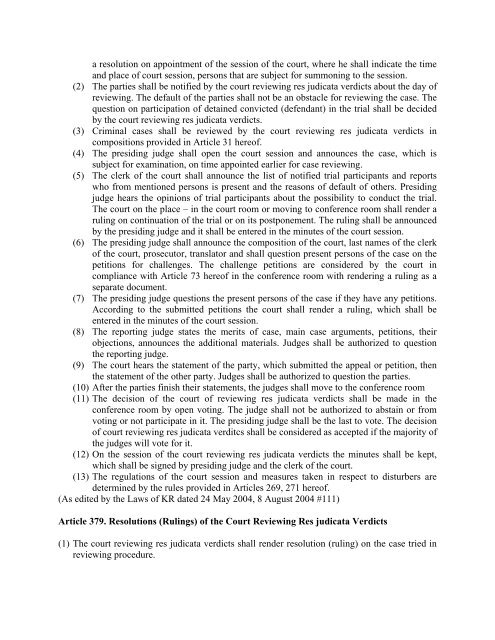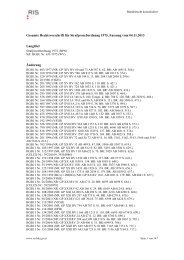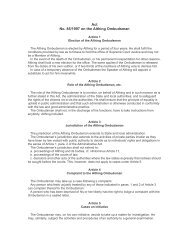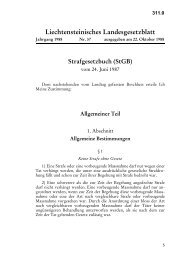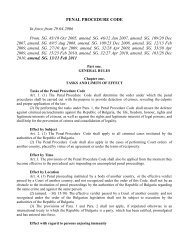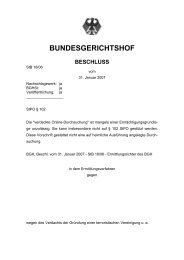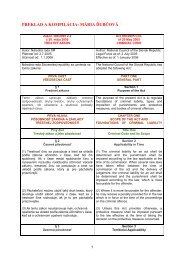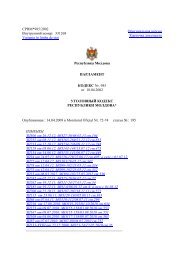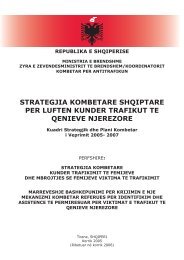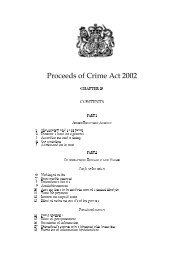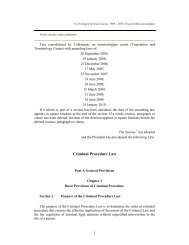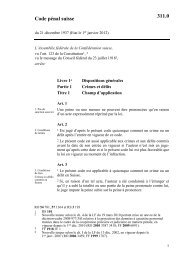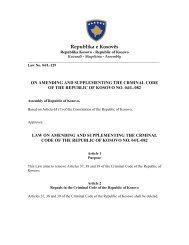Criminal Procedure Code of the Kyrgyz Republic - Legislationline
Criminal Procedure Code of the Kyrgyz Republic - Legislationline
Criminal Procedure Code of the Kyrgyz Republic - Legislationline
You also want an ePaper? Increase the reach of your titles
YUMPU automatically turns print PDFs into web optimized ePapers that Google loves.
a resolution on appointment <strong>of</strong> <strong>the</strong> session <strong>of</strong> <strong>the</strong> court, where he shall indicate <strong>the</strong> time<br />
and place <strong>of</strong> court session, persons that are subject for summoning to <strong>the</strong> session.<br />
(2) The parties shall be notified by <strong>the</strong> court reviewing res judicata verdicts about <strong>the</strong> day <strong>of</strong><br />
reviewing. The default <strong>of</strong> <strong>the</strong> parties shall not be an obstacle for reviewing <strong>the</strong> case. The<br />
question on participation <strong>of</strong> detained convicted (defendant) in <strong>the</strong> trial shall be decided<br />
by <strong>the</strong> court reviewing res judicata verdicts.<br />
(3) <strong>Criminal</strong> cases shall be reviewed by <strong>the</strong> court reviewing res judicata verdicts in<br />
compositions provided in Article 31 here<strong>of</strong>.<br />
(4) The presiding judge shall open <strong>the</strong> court session and announces <strong>the</strong> case, which is<br />
subject for examination, on time appointed earlier for case reviewing.<br />
(5) The clerk <strong>of</strong> <strong>the</strong> court shall announce <strong>the</strong> list <strong>of</strong> notified trial participants and reports<br />
who from mentioned persons is present and <strong>the</strong> reasons <strong>of</strong> default <strong>of</strong> o<strong>the</strong>rs. Presiding<br />
judge hears <strong>the</strong> opinions <strong>of</strong> trial participants about <strong>the</strong> possibility to conduct <strong>the</strong> trial.<br />
The court on <strong>the</strong> place – in <strong>the</strong> court room or moving to conference room shall render a<br />
ruling on continuation <strong>of</strong> <strong>the</strong> trial or on its postponement. The ruling shall be announced<br />
by <strong>the</strong> presiding judge and it shall be entered in <strong>the</strong> minutes <strong>of</strong> <strong>the</strong> court session.<br />
(6) The presiding judge shall announce <strong>the</strong> composition <strong>of</strong> <strong>the</strong> court, last names <strong>of</strong> <strong>the</strong> clerk<br />
<strong>of</strong> <strong>the</strong> court, prosecutor, translator and shall question present persons <strong>of</strong> <strong>the</strong> case on <strong>the</strong><br />
petitions for challenges. The challenge petitions are considered by <strong>the</strong> court in<br />
compliance with Article 73 here<strong>of</strong> in <strong>the</strong> conference room with rendering a ruling as a<br />
separate document.<br />
(7) The presiding judge questions <strong>the</strong> present persons <strong>of</strong> <strong>the</strong> case if <strong>the</strong>y have any petitions.<br />
According to <strong>the</strong> submitted petitions <strong>the</strong> court shall render a ruling, which shall be<br />
entered in <strong>the</strong> minutes <strong>of</strong> <strong>the</strong> court session.<br />
(8) The reporting judge states <strong>the</strong> merits <strong>of</strong> case, main case arguments, petitions, <strong>the</strong>ir<br />
objections, announces <strong>the</strong> additional materials. Judges shall be authorized to question<br />
<strong>the</strong> reporting judge.<br />
(9) The court hears <strong>the</strong> statement <strong>of</strong> <strong>the</strong> party, which submitted <strong>the</strong> appeal or petition, <strong>the</strong>n<br />
<strong>the</strong> statement <strong>of</strong> <strong>the</strong> o<strong>the</strong>r party. Judges shall be authorized to question <strong>the</strong> parties.<br />
(10) After <strong>the</strong> parties finish <strong>the</strong>ir statements, <strong>the</strong> judges shall move to <strong>the</strong> conference room<br />
(11) The decision <strong>of</strong> <strong>the</strong> court <strong>of</strong> reviewing res judicata verdicts shall be made in <strong>the</strong><br />
conference room by open voting. The judge shall not be authorized to abstain or from<br />
voting or not participate in it. The presiding judge shall be <strong>the</strong> last to vote. The decision<br />
<strong>of</strong> court reviewing res judicata verditcs shall be considered as accepted if <strong>the</strong> majority <strong>of</strong><br />
<strong>the</strong> judges will vote for it.<br />
(12) On <strong>the</strong> session <strong>of</strong> <strong>the</strong> court reviewing res judicata verdicts <strong>the</strong> minutes shall be kept,<br />
which shall be signed by presiding judge and <strong>the</strong> clerk <strong>of</strong> <strong>the</strong> court.<br />
(13) The regulations <strong>of</strong> <strong>the</strong> court session and measures taken in respect to disturbers are<br />
determined by <strong>the</strong> rules provided in Articles 269, 271 here<strong>of</strong>.<br />
(As edited by <strong>the</strong> Laws <strong>of</strong> KR dated 24 May 2004, 8 August 2004 #111)<br />
Article 379. Resolutions (Rulings) <strong>of</strong> <strong>the</strong> Court Reviewing Res judicata Verdicts<br />
(1) The court reviewing res judicata verdicts shall render resolution (ruling) on <strong>the</strong> case tried in<br />
reviewing procedure.


